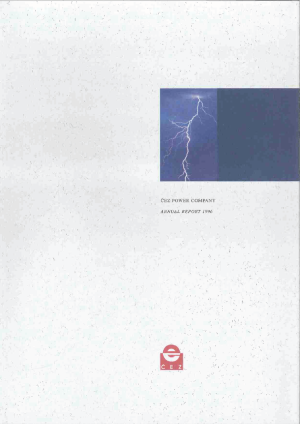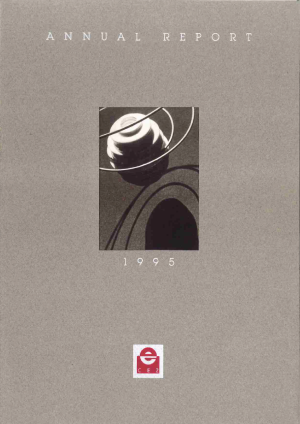Annual reports
Interview with the Chairman of the Board of ČEZ, a. s.
What do you consider the most important news for shareholders?
Definitely it is the market performance of our company’s shares. On the Prague Stock Exchange, the share price of ČEZ, a. s. grew by 134% in 2004 (from CZK 146 to CZK 341). This equates to a CZK 115 billion increase in shareholder value. Sharp gains early on in 2005 continued and the shares quickly broke through the CZK 400 barrier. Market capitalization exceeded USD 10 billion, making ČEZ, a. s. one of the top 500 corporations in the world.
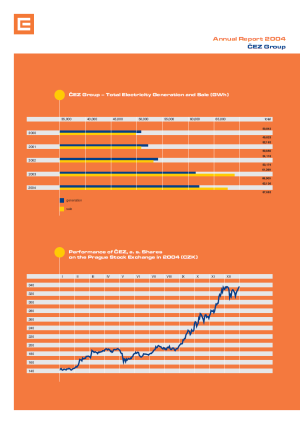 How did last year shape up in terms of financial performance?
How did last year shape up in terms of financial performance?
In 2004, ČEZ Group turnover exceeded CZK 100 billion for the first time, operating profits reached CZK 19.2 billion, and net earnings less minority shares stood at CZK 13.1 billion. Our profits are perceived – especially here at home – as gigantic. However, it must be borne in mind the huge value of the assets that are necessary to generate such profits. Our return on invested capital, 5.8%, will not seem excessively high to anyone. Still, we have set for ourselves a more ambitious goal: by 2008 we intend to increase this rate of return to 10%. Then we will be able to generate shareholder value.
ČEZ, a. s. has declared its objective of becoming the leader in the electricity markets of Central and Southeastern Europe. How are you progressing towards this goal?
The success in the privatization of distribution companies in Bulgaria, where ČEZ acquired the most valuable group that was offered, as well as our success in the tender for the Romanian distributor, Electrica Oltenia S.A., are the first steps on this road. The former acquisition, i.e. that of three Bulgarian distribution companies, made ČEZ, a. s. a corporation with international reach. In addition, this investment of nearly CZK 9 billion is the biggest ever foreign direct investment by a Czech company. We are monitoring the situation in Poland, where the privatization of the power sector is mostly still in the preparatory stages. Possible acquisition targets are also emerging in Macedonia and Montenegro. Also, Romania is planning to sell off some of its generation facilities.
Aren’t you sorry that you didn’t win the tender for Slovenské elektrárne, a.s.?
We really did want Slovenské elektrárne, a.s., because we saw a lot of potential for leveraging synergies there in alliance with ČEZ, a. s., thereby reducing costs for both sides. However, we will always proceed in the interests of our shareholders and make only those investments that are sure to bring a financial return for our owners. We offered a price that was based on our clear view of the target company’s value and that took into account the potential for future cost savings from the interconnection of the generation bases of both countries. The competition offered more, but looking at the performance of the ČEZ, a. s. share, shareholders evidently appreciated our decision on this acquisition.
How is ČEZ’s commercial position shaping up?
I’ll start with the aspect that relates to the previous question. Thanks to the acquisition of Bulgarian and Romanian distribution companies, the number of customers rose from 3.4 million to 6.6 million. This near doubling of the customer base puts us in a very good position for the future. Moreover, the overall development of the pan-European electricity market is playing in our favor. ČEZ, a. s. is benefiting from an across-the-board rise in electricity prices as most power companies in Europe prepare to renew their generation base. Sure, it isn’t pleasant for customers that ČEZ’s wholesale electricity price for 2005 is 11% higher than the 2004 price, but this increase is substantially less than the trend in neighboring countries. ČEZ, a. s. is successfully selling its surplus capacity in foreign markets. The price of exported electricity is also on the rise and, in new contracts for 2005, it has reached domestic levels for comparable products. We have reinforced our position as the key supplier of ancillary services to ČEPS, a.s., whose 71% market share is similar to ours. In the domestic retail segment, ČEZ Group is building a network of representations and a central call center to improve our customer services. As a result of this move, service quality will be unified at the same high level of quality nationwide.
On what principal goals will the company concentrate in the near term?
The objective of ČEZ, a. s. will be to continue in the long-term good operating performance trends and maximize earnings for our shareholders. We will focus on integrating operations within ČEZ Group in the Czech Republic and thereby also on complying with our unbundling obligations under law. We will also focus on fine-tuning the new organization structure, having transitioned to a divisional model in conjunction with Group integration. We also have the opportunity to further grow the company through foreign acquisitions. A very important area for us will be the renewal of our generation base, since our current power stations are set to reach the end of their useful lifetimes starting in 2010. Their successful replacement and the securing of the necessary raw materials and other resources for their operation will lay a foundation upon which the companies of ČEZ Group can build good performance in the decades to come. In conclusion, let me thank the employees of ČEZ Group, as well as our shareholders and business partners, for the part they played in the company’s favorable performance in 2004. The situation in European power markets and our successful foreign acquisitions debut reinforce my conviction that, together, we are headed in the right direction.
Martin Roman
Chief Executive Officer and Chairman of the Board
Download
Introduction by the Chairman of the Board of Directors
How did the Group’s financial performance pan out in comparison with 2002?
First of all, I must say that the performance results of ČEZ Group in 2003 were substantially influenced by changes in the Group and therefore it is difficult to make a year-on-year comparison. While in 2003 we consolidated – either fully or by the equity method – a total of 33 companies, in 2002 the consolidated group consisted of just four companies. In 2003, the expanded ČEZ Group, containing equity interests in the electricity distribution companies, achieved major growth in revenues from sales of electricity (by CZK 26.6 billion, or 50.3%) thanks to the inclusion of sales to final customers by the five electricity distribution companies in ČEZ Group, but also thanks to higher sales of electricity in the liberalized wholesale market. On the other hand, the sale of a 66% ownership interest in ČEPS, a. s. did not have a direct impact on the profit figure, but it did lead to an increase in consolidated shareholders’ equity. Net income did not reach 2002’s level (CZK 8.4 billion), and declined to CZK 5.9 billion (down by 29.6%). The principal factors contributing to this decline included changes in the nuclear power plants area – a CZK 2.8 billion increase in depreciation charges related to Temelín Nuclear Power Station and also a CZK 3.5 billion increase in nuclear provisioning.
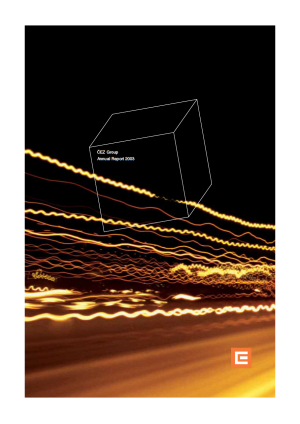 What, in your opinion, was the company’s biggest accomplishment in 2003?
What, in your opinion, was the company’s biggest accomplishment in 2003?
What do you appreciate the most and what do you think is the best news for shareholders? Certainly the acquisition of stakes in the Czech electricity distribution companies – majorities in five cases. Immediately thereafter, an agreement was reached with E.ON, which was formalized upon completion of the already mentioned process of integrating the ČEZ, a. s. production base with the electricity distribution companies. It is a promise for the future that, despite the necessary presence of competition in the electricity market, ČEZ, a. s. will be capable of reaching mutually beneficial agreements with its competitors.
ČEZ Group has set for itself the goal of becoming a leader in the Central and Eastern European electricity market. What steps have you already taken on this road?
At this moment, ČEZ, a. s. is bidding in two tenders – for Slovenské elektrárne, a.s. and the Bulgarian distribution companies. We are also monitoring the situation in Poland, where the privatization of the power industry has yet to move out of the preparation phase. The Hungarian market also holds some potential business opportunities.
How would you describe ČEZ Group’s performance in the liberalized electricity market in the Czech Republic? After all, it’s been two years since the market was first opened up to competition.
ČEZ Group has done very well to-date, but the market is still not yet completely open, and we still have a long way to go. Often it is more difficult to defend a position than to gain it. But I am convinced that our success will hold as we go forward.
On what areas will the company focus this year and what are your most important near-term goals?
The goal of ČEZ Group will be to continue in its long-term trend of strong financial performance. However, we cannot count on such strong one-off factors such as the proceeds from last year’s sale of ČEPS, a.s. Instead, we will have to prepare ourselves well for the full liberalization of the electricity market starting in 2006. The reason: in the past, opening up of markets to competition has had a negative impact on the earnings of most European power companies. Other goals of ČEZ Group are to become a leader in the Central European electricity market through acquisitions in other countries and to create a functional and effective ČEZ Group by completing the integration of the electricity distribution companies.
This year, ČEZ, a. s. is publishing a separate Corporate Responsibility Report. In what way do you see a corporation like ČEZ, a. s. having responsibility for society? Is that in shareholders’ interests?
Corporations like ČEZ, a. s. are often referred to as public utilities and that implies a universal role. ČEZ, a. s. is a Czech power company – one of the strongest corporations in the Czech Republic – and it also has responsibility for the development of society in all its forms and aspects, not just in electric power. One aspect of our sponsorship program is guided by the slogan “We help where we operate” and that, I think, speaks for itself. And, certainly, this broader responsibility is in the interests of shareholders, too. Good relations also lead to good results. In conclusion, allow me to thank the company’s employees, shareholders, and business partners for the roles they played in driving the company’s solid financial performance in 2003. I am confident that our joint efforts will continue to guide the company in a positive direction in the future, as well.
Martin Roman
Chairman of the Board of Directors and Chief Executive Officer
Download
Dear shareholders,
The past year presented CEZ a major challenge in the form of the opening up of the Czech electricity market to free competition. As of January 2002, several dozen of the largest electricity customers, representing nearly 30% of total consumption in the Czech Republic, gained the right to choose their electricity supplier. However, an even more important milestone than this was the fact that the regional distribution companies gained the same right to freely choose their supplier, to the extent that they are still obligated to supply electricity to protected customers. The significance of these changes was that the Czech Republic’s wholesale electricity market, in which CEZ sells most of the electricity it generates, was fully – 100% – opened up to competition, not just among domestic producers, but also in the form of imports from other countries. I am happy to be able to report that CEZ performed honorably in this important first year of the competitive market. Thanks to our “Rainbow Power” offering, we maintained our position without significant losses. “Rainbow Power” became known as a synonym for low-priced, Czech, reliable, environmentally friendly power, as well as a symbol of the opening up of the domestic electricity market. We not only maintained but actually strengthened our position in the European electricity market, primarily by penetrating new territories. This was accomplished despite the uneven playing field we had to deal with.
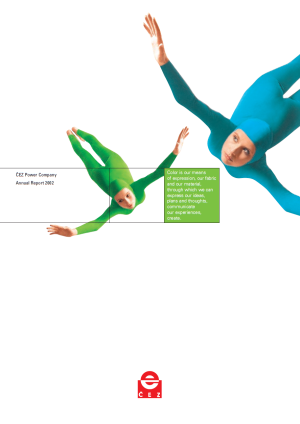 We faced an uneven playing field in the domestic market, where the mandatory purchasing of cogeneration power at fixed prices gave our competitors an unfair advantage, even considering the offer of supplemental condensation generation of electricity. A portion of our own cogeneration production from facilities connected to the transmission grid was denied this fixed price. The playing field in foreign markets was also uneven, since administrative barriers and bans remain in effect there despite the ongoing liberalization process. It must be stated that only part of the asymmetry was corrected for this year. Therefore, we consider it our duty to continue to work for the removal of discriminatory elements that put CEZ at a disadvantage compared to our competition, since that damages not only you, our shareholders, but in the end it also damages customers, since electricity prices do not reflect the lowest possible costs of procurement.
We faced an uneven playing field in the domestic market, where the mandatory purchasing of cogeneration power at fixed prices gave our competitors an unfair advantage, even considering the offer of supplemental condensation generation of electricity. A portion of our own cogeneration production from facilities connected to the transmission grid was denied this fixed price. The playing field in foreign markets was also uneven, since administrative barriers and bans remain in effect there despite the ongoing liberalization process. It must be stated that only part of the asymmetry was corrected for this year. Therefore, we consider it our duty to continue to work for the removal of discriminatory elements that put CEZ at a disadvantage compared to our competition, since that damages not only you, our shareholders, but in the end it also damages customers, since electricity prices do not reflect the lowest possible costs of procurement.
The past year was also a major milestone for the Temelín Nuclear Power Station project. Unit One began commercial operation in June 2002 and, since then, it satisfied its production quotas reliably. Also, Unit Two supplied the grid with its first megawatt-hours, produced during power tests. After those tests were successfully completed, Unit Two was put into commercial operation in April 2003.
For further successful operations in domestic and foreign markets, we will need in particular to have an efficient organization and low production costs. For that reason, we have made and are still making major changes to our organization, the aim of which is to beef up our sales capability and realize the cost-savings potential inherent in centralizing certain functions and in the system for controlling and directing the production process. 2002 saw the formation of a new section dedicated to corporate strategy. In January 2003, the last phase of the internal company changes was begun: after nearly one year of preparations, the Nuclear Power Section was formed and the managements of both of our nuclear facilities were folded into it. The results to-date of our Conventional Power Section clearly confirm that our chosen path of fundamental organizational change was the right one, since it has brought streamlined decision-making processes, more accountability, and cost savings. It is certainly worth mentioning here that, so far, this section has achieved a cost savings of nearly one billion crowns.
Before us, however, stands a no less important goal. That goal is to integrate the regional distribution companies into the CEZ Group, as decided by last year’s Annual General Meeting on the basis of the Government’s privatization decision. Looking at the development of the power sector in the countries of the European Union, where the Czech Republic is headed, we are convinced that the merging of a large portion of domestic production capacity with distribution, as well as the simultaneous spin-off of electricity transmission, are both steps in the right direction. That is because they fully respect the electricity market liberalization conditions set by the European Commission in 1996 as well as the amendment thereof, which is under preparation. They also bring the Czech Republic structurally closer to advanced western European countries in which (except for Luxembourg and the Netherlands) electricity generation and distribution are linked together in the production chain. Here it must be emphasized that this power sector model brings substantial benefits to customers.
Earnings after tax are a realistic estimation of the company’s financial performance. Net profit of CEZ itself, according to Czech accounting standards, was CZK 6.7 billion in 2002, up 4.3% from the previous year. Consolidated net profit according to Czech accounting standards totaled CZK 7.3 billion. According to international accounting standards, CEZ posted a profit of CZK 8.4 billion.
One major contributing factor in the above results was our new sales policy, which enabled us to reach record power generation of over 54 TWh in 2002. Thanks to this policy, we are maintaining a high degree of utilization in our fossil generating facilities. Indeed, in spite of Temelín Nuclear Power Station going on-line, our conventional power generation volumes were higher than before the year 2000. That said, I do not want and am not able to conceal the fact that our successes in sales and strict cost controls were not the only factors contributing to the good results – the development of CZK exchange rates and certain changes in Czech accounting methods also played a role.
An even more important standard of measurement, perhaps, for the company and its shareholders is the company’s ability to generate cash reserves. After long years of capital spending on new facilities and upgrades, we now want to bring our behavior more in line with the market principles that govern European power companies by proposing a more attractive dividend policy to the General Meeting.
One of the key tasks of company management is continuous improvement in the company’s performance. The organizational changes mentioned above reduced the company’s work force to 7,677 at year end 2002, a reduction of 334 employees. In this respect I would like to remind readers that in 1992, when CEZ was established as a joint-stock company, we had over 16,000 employees, and the company began the year 2000 with 9,749 employees. Material work force cuts will continue in the newly formed Nuclear Power Section in 2003 and 2004, always following a careful analysis of processes and without compromising our high nuclear safety standards. In the company’s other sections, however, there is very little leeway for making any more cuts.
CEZ always meets its statutory obligations towards stakeholders, including employees, creditors, and suppliers. And we must emphasize that, in this respect, CEZ is one of the pillars of the Czech economy.
The unveiling of our new “Rainbow Power” brand and the reshaping of the company from an exclusively production based firm into one that focuses on both production and sales, selling first and foremost electricity generated in-house, is beginning to bear fruit. At the end of 2002, just like the year before, we had contracted for 90% of planned 2003 production output. According to our calculations, our emphasis on utilization of domestic inputs – everything from fuels and other raw materials to repairs, training and services – provides jobs to over 100,000 workers in companies connected with the power sector. That makes “Rainbow Power” a good buy. Last year, we reduced the price of a “Rainbow Power” by 4% compared to the price level set by the Energy Regulatory Office. For this year we offered our customers prices that are 8% lower than that. That means that the price of electricity offered by CEZ today is at the level of 1992’s price. Unfortunately, not all end customers are able to profit from our prices, and that is one of the reasons why we are advocating a faster opening up of the Czech utilities market (i.e., both electricity and natural gas) to competition, so that our offering can reach the widest possible range of customers.
I am convinced that the 2002 performance results presented in this Annual Report will assure you that we have taken the right path.
Jaroslav Míl
Chairman of the Board of Directors and CEO
Download
Dear shareholders,
This Annual Report presenting the results of the year 2001 finds its way to you in the time when ČEZ, a. s. is celebrating its tenth anniversary. I am pleased to be in a position to call these past ten years a very successful period. Since its foundation, ČEZ, a. s. has been in the black each year and has generated stable cash flows from its operations. This crucial achievement helped us successfully implement a financially demanding environmental program at our conventional power stations at the same time as we were building Temelín Nuclear Power Station. During 2002 both generating units of Temelín, our largest power station, will be put into trial operation, thereby bringing this demanding period to a close. Its completion will be a great advantage, since the tasks on which we are currently focusing are substantially different – now it is time to take our place in the European-wide electricity market as it gradually opens up to competition.
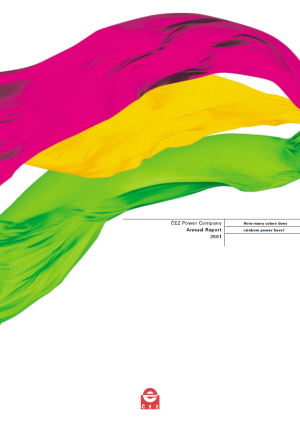 That is also the reason why we brought an entirely new product – “Rainbow Power” – to the domestic market. We are confident that it will become a synonym for inexpensive, environmentally friendly energy from the Czech Republic, associated with the ČEZ name. At the same time, we are fully aware that effective organization and low production costs are pre-conditions for us to operate successfully in the domestic and foreign markets.
That is also the reason why we brought an entirely new product – “Rainbow Power” – to the domestic market. We are confident that it will become a synonym for inexpensive, environmentally friendly energy from the Czech Republic, associated with the ČEZ name. At the same time, we are fully aware that effective organization and low production costs are pre-conditions for us to operate successfully in the domestic and foreign markets.
Therefore, we have carried out major changes in the organization to strengthen our sales functions and take advantage of all the benefits of centralization. In order to help sell electricity, we established a new organizational unit, ČEZTrade, in which effective 1 March 2002 we concentrated all our electricity sales activities, including international trades. Following a major reorganization in 2000, the Head Office now focuses first and foremost on strategy, controlling, finance, property management, and similar issues. In 2001, with the formation of the “Conventional Power” section, we carried out fundamental changes in how our coal and hydro power stations are organized and in late 2002/early 2003 we will implement similar fundamental changes in the nuclear stations – i.e., a new “Nuclear Power” section will be formed to manage all the company’s operations in nuclear power. Only through measures such as these can we bring about further cost savings, cut decision-making times and define in much better and more specific terms the accountability of all our employees.
These developments are crucial to prepare the company for the arrival of the fully competitive environment of the liberalized electricity market, in which ČEZ will be able to defend and reinforce its market position mainly by the price at which it offers its electricity to customers. In my opinion, our position is very good: we possess a fully balanced portfolio of production facilities that are able to meet demanding customer requirements at competitive cost levels not just in terms of supplying electric power, but also in terms of ancillary services in the Czech Republic Power System. Among Czech corporations in 2001 ČEZ was the most profitable and we also managed to make major inroads in foreign markets – we now export a quarter of our overall production. Maybe here is one area where we can discern the possible causes of certain not entirely transparent activities by which some have endeavored to cast our several dozen of the largest customers, representing approximately 30% of overall consumption. However, the market is already open to imports from foreign countries and regional distribution companies have become Eligible Customers within the rest of the market in order to cover the consumption of customers temporarily captured by them. What that means for all producers, us included, is that the market is 100% open starting in 2002.
There are some asymmetric elements in the liberalized market environment: for example, imports enjoy a price advantage over domestic electricity, and there is unjustified support for small generation facilities powered by renewable resources (while our large hydro plants are excluded from these advantages). The regulated purchase prices for electricity from co-generation prefer facilities with lower installed capacities which ČEZ does not operate. What is more, the advantages are reserved only for electricity supplied to the distribution grid, while ČEZ has most of its facilities connected to the transmission grid. Also, transmission grid use fees are not in line with justified costs for all players. Thus, the current conditions can be considered discriminatory, placing ČEZ and its shareholders at a disadvantage compared to certain other Czech producers and importers. In the end, customers are also disadvantaged, since the price of electricity does not reflect the lowest possible costs of its procurement. It is evident that this state of affairs is not acceptable or even sustainable over the long term. We at ČEZ, a. s. consider it our duty to endeavor to change it as soon as possible so as to level the playing field in the industry.
Realistically, the best expression of financial performance is profit. ČEZ’s after-tax profit according to International Financial Reporting Standards (IFRS) totaled CZK 9.1 billion, up CZK 1.9 billion (26.1%) from the previous year. We would like to continue paying dividends to you, our shareholders. Our current results and future forecasts are such that it will be our duty to do so.
A major goal of the company is to continuously improve our performance. To this end, we achieved an over 22% yearon- year increase in EBITDA per employee. The organizational measures mentioned above have allowed us to lower the number of ČEZ employees; in 2001 we cut the head count by 1,243, to 7,552 at year end. We expect to continue in this trend in 2002 and, even more so, in 2003, especially at the nuclear power stations in conjunction with the formation of the Nuclear Power Section.
Contributing to these good performance results were, of course, the company’s sales policies, but also excellent – indeed, record-setting – electricity production in 2001, achieved in both conventional and nuclear power stations. On the nuclear side, Temelín Nuclear Power Station played a role alongside its older sister, Dukovany, for the first time, generating over 1 TWh during tests of its Unit One.
As I have mentioned, in the sales area the name of ČEZ, a. s. is already associated with the new trademark: “Rainbow Power”, which is a symbol of how we are transforming ČEZ from a purely electricity producing enterprise into a company that also markets is products, a company that sells electricity produced in our generating facilities out of Czech inputs. By the end of 2001 we managed to sell 90% of the electricity we plan to produce in 2002. I am confident that “Rainbow Power” will become a symbol of the liberalization of the Czech Republic energy market, since it is a Czech product that, according to our calculations, gives jobs to over 100,000 people working in the energy sector both directly and indirectly, through activities such as raw materials extraction, repairs & maintenance, training, services, etc. “Rainbow Power” is also a good bargain, since we have lowered the prices at which we sell our electricity by roughly 5% compared to last year’s Energy Regulatory Office price decree. We have been selling electricity at approximately the same price since 1992. Unfortunately, this fact has for all practical purposes not yet been reflected in the prices paid by small customers. We would like to offer “Rainbow Power” to other customers as well. Our priority for 2002 was not to win over end users as customers, when we came out with the philosophy of cooperating with the regional distribution companies. Nevertheless, a market that is open 100% for producers and only 30% for customers is, from our perspective, open in a lopsided way. Therefore, we would welcome a faster pace of market liberalization so that we can market our product to the widest possible range of customers.
Another priority that I must mention is that of developing the company without the involvement of a strategic partner, since the search for one failed in late 2001 and early 2002. While a strategic partner would have given us relatively problem-free access to European markets, without such a partner our priority will be to capture a strong position in the Central European region. That is why we have actively entered the recently commenced privatization process in Slovakia’s electric power industry, declaring our interest in Východoslovenská energetika, a.s. and also declaring our interest in Slovenské elektrárne, a.s. in the event it is privatized.
We are also monitoring and supporting further steps by the Czech Government in its new project of linking up a decisive portion of Czech electricity production and distribution, on the one hand, and bringing about a greater division of production and transmission, on the other. In our opinion, this is a step in the right direction that optimally reacts to the development of conditions in this business area in Europe. Also, the Czech market will continue to retain a high degree of transparency compared to most countries of the European Union. At the same time, we are aware that in the Czech electricity market there still persist certain conditions that are discriminatory towards our company, and we will put up a sustained effort to bring about their removal.
Dear shareholders, in this message I have endeavored to convince you that our realistic goal is to win and defend, in a sustained, permanent fashion, a strong position for our company in the Czech market, as well to maintain our positions in European electricity markets.
Only by doing this can we ensure the highest long-term return on the capital you have invested in our company.
Jaroslav Míl
Chairman of the Board of Directors and CEO
Download
Dear shareholders,
With this 2000 Annual Report we are pleased to present you with information on the actvities of ČEZ, a. s. ("ČEZ" or the "company") during the past year. We´ll also acquaint you with our archievements, the plans we are currently implementing, and tasks that still await us.
In this introduction to the Annual Report, I would like to share with you my thoughts on several fundamental questions relating to the current status and further development of ČEZ. I am confident that the document you have just opened will convince you that ČEZ is a healthy corporation with a bright future and open information policies.
Jaroslav Míl
Chairman of the Board of Directors and CEO
Download
Download
Dear Shareholders
During the years 1993 - 1998, ČEZ completed one of the most demanding environmental programs ín the Czech republíc, at the cost of CZK 15 billion. All power stations owned by CEZ were desulfurízed and brought into compliance with the "Clean Air Act." In terms of the short completion time and the sheer volurne of expendíture, this capítal investment project is unparalleled not only in Central Europe, but in the world as well. The project puts the energy sources of ČEZ in the same starting position as any power plant in Western Europe and gives us the opportunity to participate in Western European markets.
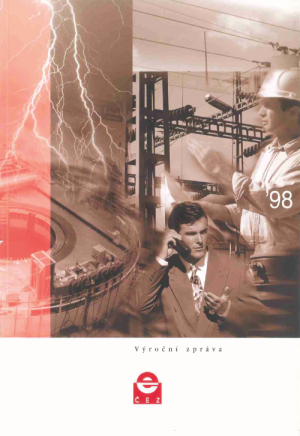 Another important step for the Company was the spin-off of the Transmission System Division into a new subsidiary, ČEPS, a. s. ČEZ management thereby fulfilled the task assigned by lhc shareholder meeting in June, 1998. This step is the fírst on the road towards compliance wíth the EU Electricity Market Directive. CEZ Power Company ís thus helping to bring the Czech Republic closer to the European market environment and laying the groundwork for the Czech power industry's integration into the system now being created in Europe.
Another important step for the Company was the spin-off of the Transmission System Division into a new subsidiary, ČEPS, a. s. ČEZ management thereby fulfilled the task assigned by lhc shareholder meeting in June, 1998. This step is the fírst on the road towards compliance wíth the EU Electricity Market Directive. CEZ Power Company ís thus helping to bring the Czech Republic closer to the European market environment and laying the groundwork for the Czech power industry's integration into the system now being created in Europe.
The financial markets positive view of ČEZ was expressed not only by stable ratings but also by a DEM 280 million syndicated loan provided by foreign banks. In 1998, ČEZ continued to rneet all its financial obligations, thus reinforcing its reputation, as a good, credit-worthy company.
The Temelín Nuclear Power Station, the Company's largest ínvestment, received a new senior management team in 1998. The new management signed the fínal amendments to supplier contracts and approved a binding budget and work timeline for the long expected completion of the project. In addition, insurance policies were acquired to protect the Company's fixed assets at its two nuclear facilities.
Dear shareholders, allow me to assure you that Company management ís giving due attention to all issues related to directing the Company. The goal is to manage the Company efficiently, increase shareholder value and manage corporate assets with due professional care. I am convinced that (ČEZ will be successful in the difficult period to come, when external factors will put pressures on the Company's flexible management and cause us to face heretofore unknown problems and barriers. It is my belief that, with your support, we will overcome these obstacles lo strengthen the Company's positíon on the domestíc electricíty market and prepare it for the liberalized European market.
Milan Černý
Chairman of the Board and Chief Executive Officer
Download
Dear Friends,
ČEZ power company last year celebrated the fifth anniversary of its establishment. Throughout this period we have fulfilled our main mission - to provide our customers with electrical energy and other related services in a reliable and economically feasible manner. This reliability was not affected by the tragic July flooding, which struck Moravia and the eastern part of Bohemia, despite its negative effects on ČEZ’s operations. Our commitment towards creditors and suppliers has been met duly and exactly. We have advanced significantly in the fulfillment of our entrepreneurial objectives. Our investment program, related to coal-powered stations and focused on the construction of desulphurization facilities and the overall upgrading of these resources, is striding towards its completion. Already more than three-quarters of electricity produced by the company originates from sources which comply with air protection law requirements. By year end, all of our power stations will be in compliance with these requirements.
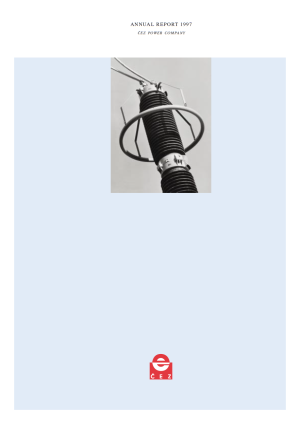 The Company’s financial results during 1997 were significantly influenced by two significant changes. The first was that demand for electricity decreased after three years of increases. The other factor was the abrogation of the fixed exchange rate regime for the Czech Crown, followed by its depreciation.
The Company’s financial results during 1997 were significantly influenced by two significant changes. The first was that demand for electricity decreased after three years of increases. The other factor was the abrogation of the fixed exchange rate regime for the Czech Crown, followed by its depreciation.
Electricity demand in the Czech Republic during 1997 decreased 1.8 % compared to 1996, to a level of 53.2 TWh. This was caused by a relatively low increase in the gross domestic product of the Czech Republic, as well as by warmer than normal weather. ČEZ was well prepared for long-lasting periods of temperatures below freezing, as was the case during previous years. Actual electricity consumption in industrial sectors was 2.3 % lower than forecasted, and 4.3 % lower in households, largely due to temperature effects.
ČEZ successfully completed the pilot operation of the synchronous interconnection to the western European system UCPTE in September 1997. The UCPTE general assembly approved the long-term interconnection of ČEZ’s networks at the end of April 1998. Based on previous positive results, the company filed an official application to become part of the UCPTE system. As a result, our customers in the Czech Republic are provided with electricity of the same quality as that obtained by western European customers and ČEZ became part of the European power field.
The overall condition of the Company and its financial state are good. The Company’s finances could, however, be negatively influenced if final electricity prices and other system service prices for ČEZ’s customers are not established quickly enough by the regulatory body. Profit before taxes was 9.5 billion CZK. Profit after taxes reached the value of 5.3 billion CZK, 46 % less than in 1996. A profit decrease is in line with our long-term predictions and is directly related to increasing depreciation and amortization costs, as well as other factors, but this big decrease represents a warning. We have reacted to this development by lowering operating costs and saved approximately 3.5 billion CZK in comparison with the annual budget. However, a negative development in the financial area, namely the depreciation of the Czech Crown, has practically offset this step. We have created a reserve in the amount of 2.1 billion CZK during the last year for unrealised exchange rate losses.
Total expenses were 42.2 billion CZK and increased by approximately 7.3 % when compared to the previous year. This was due to the creation of reserves for unrealised exchange rate losses, continuing increase of input prices, taxes and fees. The increase in depreciation and amortization costs, related to the start of operation of new investments, is very favorable from the point of view of available financial resources. Their amount is still very low, because of the historically low book value of fixed company assets in relation to their replacement value.
Total revenues reached 55 billion CZK, which is 0.7 % less than in the previous year. This was caused by lower electricity consumption in the Czech Republic and the long-term, inappropriately low regulated electricity prices between ČEZ and the distribution companies. This problem, which is not being addressed, continues to burden the management of ČEZ, as well as the distribution companies. The transfer price between ČEZ and distribution companies increased by less than 2% since 1994, when it was at its lowest value, and reached an average value of 1,048 CZK / MWh in 1997.
Strides have been made in relationships with our valued customers - distribution companies. Agreements with these customers were reached before the end of the third quarter of 1997. This meant that for several months we were supplying electricity to a group of our customers without a proper contractual arrangement. This, however, did not affect the quality of supply . Compared to previous years, this can be considered a significant improvement. A large part of this accomplishment was due to the increased effort of both parties responsible for the establishment of prices, the Ministry of Industry and Trade of the Czech Republic and the Ministry of Finance of the Czech Republic, since they had established the regulated transfer prices for 1997 already in April 1997.
Total indebtedness at the end of 1997 was 33.8 % of total assets, whereas long-term indebtedness was 24.1 %. Company financing was ensured gradually during the entire course of 1997. This was partially caused by ČEZ’s second successful foray into the international capital markets. An issue of bonds on the American market (so-called Yankee Bonds) with a value of 200 million USD, with a 10-year maturity period, took place in July. At the same time, ČEZ hedged this issue to protect against exchange rate and interest rate risks. ČEZ thus became the first enterprise located in Central and Eastern Europe with a fully registered bond issue on this market. The remaining financing of the Temelín Nuclear Power Plant construction was succesfully completed with a USD 372 million loan. The loan was obtained from a consortium of banks led by Citibank London and Generale Bank Brussels, guaranteed by the EXIM Bank of the United States of America, Belgian Office National du Decroire and the Czech government. This loan was signed in 1996 but was only drawn down in the first half of 1997.
The creditworthiness of ČEZ has been verified by the confirmation of credit ratings equal to BBB+ with a positive outlook from Standard and Poor’s and Baa1 from Moody’s. This excellent evaluation allows ČEZ to obtain external financial resources for its extensive investment program.
We can report another successful entrepreneurial year by meeting our entrepreneurial objective: being an environmentally friendly electrical energy producer. In 1997, our desulphurization and upgrade program advanced far enough to allow us to produce more than three-quarters of electricity in an environmentally-friendly manner. Sulphur dioxide emissions have been lowered by more than 60 % compared to 1992. All of the remaining power stations, which will continue to be in operation after 1998, will be desulphurized during this year. We will fully meet all requirements of the air pollution control law.
The interim spent-fuel storage facility with a capacity of 600 tons in the Dukovany Nuclear Power Station has been successfully completed. Spent fuel is presently safely and reliably stored in the facility. Thousands of visitors have been convinced that the chosen storage method is of a high safety level.
The completion and operation of the Temelín Nuclear Power Station plays a significant role in the improvement of the environment and the modernization of Czech power stations. The challenging nature of this project, due to the requirement to increase the overall nuclear safety level of the future plant, continues to cause delays of individual construction deadlines. This results in the delay of the construction completion, accompanied by increasing pressure on the suppliers’ budget. The last budgetary and time schedule analyses for the completion of construction of the Temelín Nuclear Power Station were carried out in the spring of 1998. At the same time, negotiations between ČEZ and sub-contractors took place with the objective of reaching a contractual agreement on the completion date and final expenditures. According to the above analyses, the expenditures related to the construction of the Temelín Nuclear Power Station will reach 98.6 billion CZK and the date for nuclear fuel charging into the 1st unit was set for August 2000. If the above resolution is achieved, the commercial operation of the 1st unit could be initiated in May 2001. The interval between the start of operation of the 1st and 2nd unit is 18 months. Analyses are being developed in order to evaluate the possibility of a shorter interval.
The protection of individual new facilities through insurance agreements is related to the manner in which the facilities are put into operation. During 1997, ČEZ completed its negotiations in the area of property and damage insurance. An agreement, valid as of June, was finalised for the insurance of coal and hydro power station property, whereas the damage insurance agreement will be valid as of July. The transmission system property insurance agreement was negotiated in November. With respect to the so-called “Nuclear Law”, an agreement with the Czech Nuclear Pool, signed in December, relates to the insurance of legal liability for damages related to the operation of the Dukovany Nuclear Power Station. Agreements for the insurance of liability risks during the transportation of nuclear materials have been gradually negotiated with the Czech Nuclear Pool. These steps have significantly contributed to the protection of company property against damages, increasing the confidence of company shareholders.
In January 1998, an extraordinary general meeting took place by request of the National Property Fund, which is the majority shareholder of ČEZ. The ratified modification of Company statutes strengthened the direct influence of shareholders on Company management and completed the activities of previous company bodies. A new Board of Directors and Supervisory Board were selected during the shareholder meeting. The Board of Directors decided to make changes in Company management and transferred the executive directorship in its full extent onto the General Director and his deputies.
I would like to express my sincere thanks to all members of the previous Board of Directors, members of the Supervisory Board, as well as all Company employees. None of the above achievements would have been possible without their hard work and commitment.
Petr Karas
Chairman of the Board of Directores
